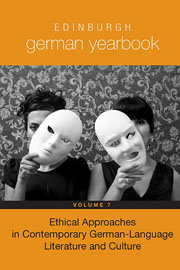 Edinburgh German Yearbook 7
Edinburgh German Yearbook 7 Published online by Cambridge University Press: 05 December 2013
The chapter “Grosse Wandelungen” in nineteenth-century Arab German writer Emily Ruete's Memoiren einer arabischen Prinzessin (1886) devotes three skeletal paragraphs to a narration of the author's relationship with a Hamburg trader and her departure for Germany, staged as a direct antidote to the “unrichtige[n] Darstellungen” at that time circulating in the German public realm that depicted these events as a grand narrative with a plot seemingly inspired by Mozart's Entführung aus dem Serail. Centering on the notion of contested representation raised by Ruete in the chapter in question, my essay will go on to explore, under the same terms, three contemporary engagements with this episode that use Ruete's narrative as source material— Tink Diaz's documentary film Die Prinzessin von Sansibar (2007), Hans Christoph Buch's novel Sansibar Blues (2008), and Nicole C. Vosseler's historical romance Sterne über Sansibar (2010). Employing a Deleuzian reading of ethics and representation, which broadly understands an ethical encounter as experiencing rather than interpreting the other's narrative, I will show how all three, precisely in their filling in the skeletal frame, work to thwart the opportunities for the ethical reading that Ruete's narrative itself presents, instead reframing her account in terms of existing narratives by and about young Muslim women.
Emily Ruete (1844–1924), born Sayyida Salme, daughter of the Sultan of Oman and Zanzibar, published her memoirs—considered the earliest surviving autobiography by an Arab woman—in Berlin in 1886. Ruete spent her childhood and young adulthood in several residences around the island of Zanzibar, and included a detailed account of this period of her life in her memoirs. In her early twenties she bought a house in Zanzibar Town, and it was there that she later became acquainted with her neighbor, a German trader named Heinrich Ruete, and the couple fell in love. In 1866 she left Zanzibar for Aden after becoming pregnant with Heinrich Ruete’s child, and he rejoined her the following year, having remained on the island to wind up his business affairs.
To save this book to your Kindle, first ensure no-reply@cambridge.org is added to your Approved Personal Document E-mail List under your Personal Document Settings on the Manage Your Content and Devices page of your Amazon account. Then enter the ‘name’ part of your Kindle email address below. Find out more about saving to your Kindle.
Note you can select to save to either the @free.kindle.com or @kindle.com variations. ‘@free.kindle.com’ emails are free but can only be saved to your device when it is connected to wi-fi. ‘@kindle.com’ emails can be delivered even when you are not connected to wi-fi, but note that service fees apply.
Find out more about the Kindle Personal Document Service.
To save content items to your account, please confirm that you agree to abide by our usage policies. If this is the first time you use this feature, you will be asked to authorise Cambridge Core to connect with your account. Find out more about saving content to Dropbox.
To save content items to your account, please confirm that you agree to abide by our usage policies. If this is the first time you use this feature, you will be asked to authorise Cambridge Core to connect with your account. Find out more about saving content to Google Drive.